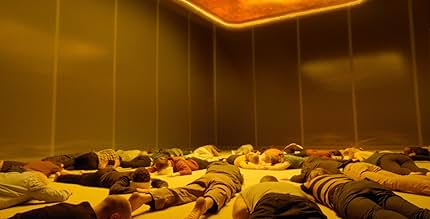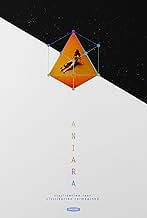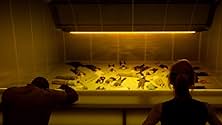Una nave que transporta a los primeros pobladores a Marte se sale de curso forzando a sus pasajeros a considerar su lugar en el universo.Una nave que transporta a los primeros pobladores a Marte se sale de curso forzando a sus pasajeros a considerar su lugar en el universo.Una nave que transporta a los primeros pobladores a Marte se sale de curso forzando a sus pasajeros a considerar su lugar en el universo.
- Dirección
- Guión
- Reparto principal
- Premios
- 11 premios y 10 nominaciones en total
Emelie Garbers
- Mimaroben
- (as Emelie Jonsson)
Reseñas destacadas
This is based on a much-loved poem in Swedish written in 1956 (when my school debating club seriously considered "That man will never reach the moon"). Bear that in mind and much makes sense - more sense than the poem ever did to me when I first tried to read it. Much that purports to be science is just poetry. The film-makers have made some attempt to update the plot and the setting, bearing in mind that we have all seen 2001: a Space Odyssey..
The science is still cheesy. The ship has lost all its fuel, but power is uninterrupted and water is abundant (there is not only an extended lesbian shower scene, but a 20m swimming pool!). The architecture of the ship is absurdly angular, but nothing ever springs a leak. The ship's interior has been compared to a shopping mall and a cruise ship, but manufactured goods never show any sign of running out, and the whole thing seems absurdly understaffed.
It's basically an exploration of how an isolated group of people copes when it is cut off from Earth, its memories and hope. The main characters are sufficiently well drawn to explore these themes in, for me, a satisfying way. On those terms, it does well and is worth watching, though you must fill the hints in the chapter headings with your own deductions.
The science is still cheesy. The ship has lost all its fuel, but power is uninterrupted and water is abundant (there is not only an extended lesbian shower scene, but a 20m swimming pool!). The architecture of the ship is absurdly angular, but nothing ever springs a leak. The ship's interior has been compared to a shopping mall and a cruise ship, but manufactured goods never show any sign of running out, and the whole thing seems absurdly understaffed.
It's basically an exploration of how an isolated group of people copes when it is cut off from Earth, its memories and hope. The main characters are sufficiently well drawn to explore these themes in, for me, a satisfying way. On those terms, it does well and is worth watching, though you must fill the hints in the chapter headings with your own deductions.
"There is protection against almost everything, against fire and damage through storm and cold, but there is no protection against humanity," said Nobel Prize winner Harry Martinson, upon whose poem this film is based. On a spaceship accelerating to Mars from the ruined earth, people shop, eat and - with the help of virtual reality - dream as they always have done. When the ship veers off course, crew leaders try to keep the passengers from learning the truth. Power struggles ensue, fantasies and fears displace reality, and the ship starts to resemble (gasp!) a mini city on earth. Caught in the middle of the chaos and the factions is a cheerful woman who tries to make the best of the unfortunate circumstances. If only her companions would let her.
Poignant and relevant to contemporary culture, directors Kagerman and Lilja adapt the poem remarkably well to the screen. The film is wonderful for what it says about human nature. The salient moral is that technology is not fail safe, and only as good as the powers who wield it. The film is hampered by a skimpy budget, shaky camera work and bad transitions, but overall the acting is believable, and it is a fascinating glimpse at the human talent for avoiding reality, for better or worse, in whatever sphere we happen to occupy. World premiere seen at the 2018 Toronto International Film Festival.
Poignant and relevant to contemporary culture, directors Kagerman and Lilja adapt the poem remarkably well to the screen. The film is wonderful for what it says about human nature. The salient moral is that technology is not fail safe, and only as good as the powers who wield it. The film is hampered by a skimpy budget, shaky camera work and bad transitions, but overall the acting is believable, and it is a fascinating glimpse at the human talent for avoiding reality, for better or worse, in whatever sphere we happen to occupy. World premiere seen at the 2018 Toronto International Film Festival.
I had... great expectations. The poem made a profound impression on me as a young boy when I read it the first time at around 12 or 13 years of age. The vision of the ship with its hapless passengers drifting endlessly across the infinite void, unable to change their ultimate destiny, descending into inevitable darkness struck a chord that still reverberates within me decades later.
Unfortunately the directors lost the ball. Instead of a much anticipated visual retelling of the epic poem we get bad acting and strange decisions on the cutting board. It seems to me the problem with the actors is that they seem to have been recruited more or less directly from the theatre, obviously a forum they are more comfortable with. The dialog is presented in a strange intonation making it stilted and unnatural. It feels false, recited rather than truly experienced. Neither are the characters given much room to become people in the eyes of the audience. Mostly they lack depth and feel more like paper cutouts, hastily put in place and given a token smear of storyline just enough to separate them from the others, rather than as real living people. Transitions between scenes ar... BLAM STOP BLACK SCREEN almost in the middle of a sentence and then a written text proclaiming the next chapter. So strange. So unnatural. So disruptive.
Yes, the movie had a limited budget which explains some of the shortcuts that had to be taken, but... 20 million actually is quite substantial sum as the story doesn't need much in the way of special effects or expensive sets, not really. The focus on the poem is not on the surroundings or the interior of the ship, but on the interactions between the people on board. No, lesbochock nudity and explicit orgies does not cover the vast rifts in the storytelling, though predicibly the attempt was made. The end result isn't bad, not really. It's worse, it's meh. Meh meh meh.
No, I am not a script writer, nor a director, in fact I have no experience with film making but... this could have been done better. So much better. So disappointed.
Unfortunately the directors lost the ball. Instead of a much anticipated visual retelling of the epic poem we get bad acting and strange decisions on the cutting board. It seems to me the problem with the actors is that they seem to have been recruited more or less directly from the theatre, obviously a forum they are more comfortable with. The dialog is presented in a strange intonation making it stilted and unnatural. It feels false, recited rather than truly experienced. Neither are the characters given much room to become people in the eyes of the audience. Mostly they lack depth and feel more like paper cutouts, hastily put in place and given a token smear of storyline just enough to separate them from the others, rather than as real living people. Transitions between scenes ar... BLAM STOP BLACK SCREEN almost in the middle of a sentence and then a written text proclaiming the next chapter. So strange. So unnatural. So disruptive.
Yes, the movie had a limited budget which explains some of the shortcuts that had to be taken, but... 20 million actually is quite substantial sum as the story doesn't need much in the way of special effects or expensive sets, not really. The focus on the poem is not on the surroundings or the interior of the ship, but on the interactions between the people on board. No, lesbochock nudity and explicit orgies does not cover the vast rifts in the storytelling, though predicibly the attempt was made. The end result isn't bad, not really. It's worse, it's meh. Meh meh meh.
No, I am not a script writer, nor a director, in fact I have no experience with film making but... this could have been done better. So much better. So disappointed.
'Aniara', the film made in 2018 by the Swedes Pella Kagerman and Hugo Lilja has the ambition of being a cosmic saga of proportions, a film in which a lot of talent, energy and hopes have been invested. The action takes place entirely on a spaceship, but not the exploration of space concerned the two authors (screenwriters and directors) of the film. Even though quite a lot has been invested in building a spaceship model that competes with similar ones in American movies, and even if the sets and props manage to create an interesting imaginary world, it is clear that the authors' attention has focused on the fate of some of the heroes and on the way they face an extreme situation, in which plans for the future are canceled or at best postponed, and the present becomes an infinite journey through a deserted space. 'Aniara' is at the same time a saga but also a story about people's reactions and the evolution of their relationships in extreme conditions.
The story of the film takes place in the near and foreseeable future in which the Earth has become either too small or uninhabitable for mankind, and a part of the population colonizes the planet Mars. Space ship Aniara is a kind of a Titanic of those times, a huge luxury space carrier, with all the comfort necessary for the three months of travel. The main heroine of the film, Mimaroben (or MR - Emelie Garbers) is the operator of a cyber salon (I am looking for a suitable term) called MIMA that combines virtual reality with artificial intelligence to offer passengers personalised experiences reminiscent of the natural ambience of the lost earthly paradise. The journey is suddenly disrupted by an incident caused by 'cosmic garbage' in which the huge space shuttle loses its ability to control the trajectory. Passengers are told that instead of three months the journey will take two years, but in fact this information is also inaccurate, because in reality the spacecraft is simply drifting in the infinite cosmic ocean. Thousands of passengers and crew members only gradually find out the truth and realize that their journey may take an eternity. The social environment that combines tourist efficiency with Scandinavian civilisation is gradually falling apart. MIMA transforms from escapist entertainment into a hallucinatory drug and object of worship. How long will the machines last? How long will people last? What happens to our civilisation when it is removed forever from the environment in which we were born?
What I liked. The film raises many interesting issues and opens up discussions worth undertaking. Emelie Garbers assumes excellently the lead role, with twists and turns of destiny that combine the collective experience with the personal one. The narrative construction is solid, even if the outcome is somewhat predictable. The sets of the impressing 'cosmic mall' traveling through space and degrading as hopes are shattered, civilisation disintegrates and violence, despair and superstition take over the survivors are presented gradually and interestingly. What I liked less. With the exception of MR, the rest of the characters are either schematically constructed (the captain of the expedition played by Arvin Kananian) or insufficiently psychologically justified (the heroine's partner - Bianca Cruzeiro). There is also a poetic thread (the film is based on a poem by a famous Swedish poet) that is lost, and the metaphor of the MIMA system (perhaps inspired by Stanislaw Lem and Tarkovsky's 'Solaris') fails to convince.
'Aniara' is an ambitious project that offers a space saga different from action movies, with less special effects and more ideas and directions for thougt and discussion. The heroes of the film are not space explorers but passengers, ordinary people like us, suddenly faced with the problems of existence and survival. Even if the execution is not perfect, even if many of the action threads are suddenly interrupted or lead nowhere, it is an interesting film for science fiction fans and not only for them.
The story of the film takes place in the near and foreseeable future in which the Earth has become either too small or uninhabitable for mankind, and a part of the population colonizes the planet Mars. Space ship Aniara is a kind of a Titanic of those times, a huge luxury space carrier, with all the comfort necessary for the three months of travel. The main heroine of the film, Mimaroben (or MR - Emelie Garbers) is the operator of a cyber salon (I am looking for a suitable term) called MIMA that combines virtual reality with artificial intelligence to offer passengers personalised experiences reminiscent of the natural ambience of the lost earthly paradise. The journey is suddenly disrupted by an incident caused by 'cosmic garbage' in which the huge space shuttle loses its ability to control the trajectory. Passengers are told that instead of three months the journey will take two years, but in fact this information is also inaccurate, because in reality the spacecraft is simply drifting in the infinite cosmic ocean. Thousands of passengers and crew members only gradually find out the truth and realize that their journey may take an eternity. The social environment that combines tourist efficiency with Scandinavian civilisation is gradually falling apart. MIMA transforms from escapist entertainment into a hallucinatory drug and object of worship. How long will the machines last? How long will people last? What happens to our civilisation when it is removed forever from the environment in which we were born?
What I liked. The film raises many interesting issues and opens up discussions worth undertaking. Emelie Garbers assumes excellently the lead role, with twists and turns of destiny that combine the collective experience with the personal one. The narrative construction is solid, even if the outcome is somewhat predictable. The sets of the impressing 'cosmic mall' traveling through space and degrading as hopes are shattered, civilisation disintegrates and violence, despair and superstition take over the survivors are presented gradually and interestingly. What I liked less. With the exception of MR, the rest of the characters are either schematically constructed (the captain of the expedition played by Arvin Kananian) or insufficiently psychologically justified (the heroine's partner - Bianca Cruzeiro). There is also a poetic thread (the film is based on a poem by a famous Swedish poet) that is lost, and the metaphor of the MIMA system (perhaps inspired by Stanislaw Lem and Tarkovsky's 'Solaris') fails to convince.
'Aniara' is an ambitious project that offers a space saga different from action movies, with less special effects and more ideas and directions for thougt and discussion. The heroes of the film are not space explorers but passengers, ordinary people like us, suddenly faced with the problems of existence and survival. Even if the execution is not perfect, even if many of the action threads are suddenly interrupted or lead nowhere, it is an interesting film for science fiction fans and not only for them.
The transitory nature of human existence, especially when set against the infinity of space and time, has been the inspiration for countless science-fiction narratives. A theme which has only become more relevant as the years go by and we find ourselves in the midst of an increasingly certain man-made extinction event, a fine example is Harry Martinson's poem, Aniara: en revy om människan i tid och rum [trans. Aniara: fragments of time and space] (1956), which is about the crippling contemplation of meaninglessness that consumes the passengers of a vast spaceship (the eponymous Aniara) set adrift in the void of space. An adaptation of the poem, this exceptionally well made film is the debut feature from writers/directors Pella Kagerman and Hugo Lilja, and is in the tradition of such esoteric texts as 2001: Una odisea del espacio (1968), Solaris (1972), Sunshine de Danny Boyle (2007), and High life (2018). And yes, the characters are a little underdeveloped, with only a couple getting much of an arc, and yes, the science isn't exactly kosher, but irrespective of that, this is a provocative, morally complex, and existentially challenging film that I thoroughly enjoyed.
Set at an unspecified point in the future, Earth has reached a point of irreversible decay, and humanity is making a new home on Mars. The Aniara is a massive vessel that takes passengers on the three-week trip from a lunar docking station to the red planet. As the film begins, we meet the unnamed protagonist (Emelie Garbers). An employee on the Aniara, she is in charge of MIMA, (hence her job as a Mimarobe, or MR for short), a semi-sentient holodeck-like technology, that can scan people's thoughts, and allow them to experience whatever is best suited for their psyche (for example, we see MR exploring a vibrant forest). A week into the voyage, however, Captain Chefone (Arvin Kananian) is forced to jettison the vessel's nuclear core to avoid catastrophy after a minor collision with space debris. However, the ship is now off-course, and without the core, the crew have no way of turning her around, leaving them drifting into the darkness of space. And so, as months turn into years, with no hope of rescue, and as people find themselves unable to face reality, MIMA becomes essential for their mental well-being. However, MIMA wasn't designed to be exposed to so many negative emotions for such a prolonged time, and soon she starts to show signs of failing.
As mentioned, Aniara was written in 1956 by Swedish Nobel laureate Harry Martinson (the title is derived from the Ancient Greek word meaning "despairing"). The poem is more allegorical than the film, and was written, at least in part, as a reaction to the bombing of Hiroshima and Nagasaki, the developing Cold War, Walter Baade's doubling of the estimated distance from the Milky Way to Andromeda in 1953, and Soviet suppression of the 1956 Hungarian revolution. The film is divided into nine chapters, which mark the passage of time. So, for example, the first three chapters are "Hour 1: Routine Voyage", "Week 3: Without a Map" and "Year 3: The Yurg". The titles of some of the later chapters contain pseudo-spoilers, so I won't mention them here, but when the title of the last chapter appeared on screen, I was so sure I'd misread it that I had to ask my friend for confirmation. Turned out I'd read it just fine; this last title contains all the existential dread and mind-bending contemplation of infinity that you could ever want. And it's an absolutely haunting way to end the film.
Much as is the case with the poem, the film looks at issues such as the possibility that we have already irreparably damaged the planet, the impermanence of human existence, and the sense of meaninglessness that can result when mankind is faced with the eternity of time and space. In relation to this, the film spends a good deal of time on the idea that human civilisation is essentially a construct that we use to shield us from the bleak reality that we are utterly insignificant, and when that construct is removed, we revert to barbarism. So, basically your typical multiplex stuff. The passengers on the Aniara become increasingly unable to stave off the encroaching malaise born from the hopelessness of their situation and the meaninglessness of their existence, and one of the most important lines in the film is when MR is told "everything we do is peripheral". Uplifting stuff.
One of the film's most interesting themes concerns MIMA, which is depicted as half-mind control, half-narcotic. As she becomes more important post-collision, it doesn't take long for people to become dependent on her, with large queues forming, and people at the back trying to bribe MR to get in early. Then, when MR hires another employee, she explains that she'll need to "teach them to resist the images", recalling the way people who work in pharmaceutical factories are randomly drug-tested. That's the narcotic element. At the same time, when a passenger proves unable to handle reality and becomes violent, he is forced to experience MIMA against his will and is rendered unconscious. That's the mind-control element. However, MIMA is also semi-sentient, and she soon proves reluctant to continue processing the never-ending onrush of negative emotions, with the passengers' sense of pointlessness and despair becoming overwhelming, to the point that she tells MR, in a surprisingly moving scene, "I want peace". HAL 9000 she is not; he'd have been able to suck it up.
Another theme, of course, is mankind's destruction of Earth. Whereas once, science fiction narratives focused on nuclear warfare as humanity's probable extinction event, in recent times, global warming and ecological disaster have become far more pervasive. Indeed, Martinson himself was something of a pioneer in this field, positing that we were destroying the planet long before climate change had entered the zeitgeist. In relation to this, the possibility that we may colonise other worlds is now seen not as something to facilitate exploration, but to facilitate survival. Of course, this is rendered all the more terrifying because it's not something only found in the realm of fiction - the planet is dying. But when you have a US president who ignores the scientific evidence of his own people, routinely rolls back environmental protections, and continually confuses weather and climate, the possibility of our changing course seems remote, just like the Aniara. This theme is never examined explicitly - we never learn the year in which the film is set, whether or not Earth has already died and is entirely uninhabitable or is simply on the way, nor what exactly it was that sent us into the cosmos - but it's touched on obliquely throughout and is a good example of how the film subtly engages with themes without necessarily foregrounding them.
Moving away from thematic concerns, the film's aesthetic is absolutely gorgeous. Made with a relatively small budget, the CGI is basic but highly effective. For the Aniara interiors, rather than building elaborate original sets, much of the film was shot in shopping malls and on ferries, which makes sense, as the Aniara is essentially a giant shopping mall/hotel, not unlike a luxury cruise ship. For the sets that were built from scratch, they are matched seamlessly to the location work, with the sleek minimalist post-modern (one might even say Ikea-like) style of Linnéa Pettersson and Maja-Stina Åsberg's production design working well to suggest rigid functionality.
In terms of problems, perhaps the most significant is the lack of character arcs (although this is also true of the poem). This is felt most in the lack of disparate viewpoints on the Aniara where it would have been interesting to meet characters with distinct beliefs, backgrounds, and denominations (although, having said that, the poem has no such characters). Does this leave the viewer with little with which to engage and no characters with whom to empathise? Yes, to a certain extent it does, but this is by design; the film isn't asking us to fall in love with a cast of well-rounded characters, it's asking us to engage with it at an esoteric level.
I will concede, however, that the science has some issues. Why, for example, would a ship the size of the Aniara be used as a short-distance transport vessel? It's mentioned several times that she wasn't built for long-term habitation, but if so, why are there so many amenities on board, why is the life-support system self-regulating, why are the algae farms designed to produce food indefinitely? And the practical nature of her size (4,750 meters long and 891 meters wide) throws up its own problems. Mars is (on average) 140 million miles from Earth, so for the Aniara to complete the journey in three weeks, she would need to travel at an average velocity of 277,777 miles per hour. Newton's second law of motion states that "force equals mass times acceleration"; in short, the greater the mass and the greater the speed, the more force it takes to slow down, and the power needed to slow something this big moving at such a speed is virtually unfathomable.
Nevertheless, the surrounding film is so accomplished, I can easily forgive the scientific inconsistencies. As aesthetically impressive as it is morally complex, as esoterically fascinating as it is unrelentingly despairing, this is a hugely impressive debut film. Equal parts haunting and provocative, the picture it paints of a humanity faced with its own extinction isn't a pretty one, but it is an urgent one, as we hurtle towards our own extinction, rapidly approaching the point where, like the Aniara, we will no longer have the capacity to turn around. And when we reach that point, our collective future will consist of nothing but the indifferent darkness and deafening silence of the infinite.
Set at an unspecified point in the future, Earth has reached a point of irreversible decay, and humanity is making a new home on Mars. The Aniara is a massive vessel that takes passengers on the three-week trip from a lunar docking station to the red planet. As the film begins, we meet the unnamed protagonist (Emelie Garbers). An employee on the Aniara, she is in charge of MIMA, (hence her job as a Mimarobe, or MR for short), a semi-sentient holodeck-like technology, that can scan people's thoughts, and allow them to experience whatever is best suited for their psyche (for example, we see MR exploring a vibrant forest). A week into the voyage, however, Captain Chefone (Arvin Kananian) is forced to jettison the vessel's nuclear core to avoid catastrophy after a minor collision with space debris. However, the ship is now off-course, and without the core, the crew have no way of turning her around, leaving them drifting into the darkness of space. And so, as months turn into years, with no hope of rescue, and as people find themselves unable to face reality, MIMA becomes essential for their mental well-being. However, MIMA wasn't designed to be exposed to so many negative emotions for such a prolonged time, and soon she starts to show signs of failing.
As mentioned, Aniara was written in 1956 by Swedish Nobel laureate Harry Martinson (the title is derived from the Ancient Greek word meaning "despairing"). The poem is more allegorical than the film, and was written, at least in part, as a reaction to the bombing of Hiroshima and Nagasaki, the developing Cold War, Walter Baade's doubling of the estimated distance from the Milky Way to Andromeda in 1953, and Soviet suppression of the 1956 Hungarian revolution. The film is divided into nine chapters, which mark the passage of time. So, for example, the first three chapters are "Hour 1: Routine Voyage", "Week 3: Without a Map" and "Year 3: The Yurg". The titles of some of the later chapters contain pseudo-spoilers, so I won't mention them here, but when the title of the last chapter appeared on screen, I was so sure I'd misread it that I had to ask my friend for confirmation. Turned out I'd read it just fine; this last title contains all the existential dread and mind-bending contemplation of infinity that you could ever want. And it's an absolutely haunting way to end the film.
Much as is the case with the poem, the film looks at issues such as the possibility that we have already irreparably damaged the planet, the impermanence of human existence, and the sense of meaninglessness that can result when mankind is faced with the eternity of time and space. In relation to this, the film spends a good deal of time on the idea that human civilisation is essentially a construct that we use to shield us from the bleak reality that we are utterly insignificant, and when that construct is removed, we revert to barbarism. So, basically your typical multiplex stuff. The passengers on the Aniara become increasingly unable to stave off the encroaching malaise born from the hopelessness of their situation and the meaninglessness of their existence, and one of the most important lines in the film is when MR is told "everything we do is peripheral". Uplifting stuff.
One of the film's most interesting themes concerns MIMA, which is depicted as half-mind control, half-narcotic. As she becomes more important post-collision, it doesn't take long for people to become dependent on her, with large queues forming, and people at the back trying to bribe MR to get in early. Then, when MR hires another employee, she explains that she'll need to "teach them to resist the images", recalling the way people who work in pharmaceutical factories are randomly drug-tested. That's the narcotic element. At the same time, when a passenger proves unable to handle reality and becomes violent, he is forced to experience MIMA against his will and is rendered unconscious. That's the mind-control element. However, MIMA is also semi-sentient, and she soon proves reluctant to continue processing the never-ending onrush of negative emotions, with the passengers' sense of pointlessness and despair becoming overwhelming, to the point that she tells MR, in a surprisingly moving scene, "I want peace". HAL 9000 she is not; he'd have been able to suck it up.
Another theme, of course, is mankind's destruction of Earth. Whereas once, science fiction narratives focused on nuclear warfare as humanity's probable extinction event, in recent times, global warming and ecological disaster have become far more pervasive. Indeed, Martinson himself was something of a pioneer in this field, positing that we were destroying the planet long before climate change had entered the zeitgeist. In relation to this, the possibility that we may colonise other worlds is now seen not as something to facilitate exploration, but to facilitate survival. Of course, this is rendered all the more terrifying because it's not something only found in the realm of fiction - the planet is dying. But when you have a US president who ignores the scientific evidence of his own people, routinely rolls back environmental protections, and continually confuses weather and climate, the possibility of our changing course seems remote, just like the Aniara. This theme is never examined explicitly - we never learn the year in which the film is set, whether or not Earth has already died and is entirely uninhabitable or is simply on the way, nor what exactly it was that sent us into the cosmos - but it's touched on obliquely throughout and is a good example of how the film subtly engages with themes without necessarily foregrounding them.
Moving away from thematic concerns, the film's aesthetic is absolutely gorgeous. Made with a relatively small budget, the CGI is basic but highly effective. For the Aniara interiors, rather than building elaborate original sets, much of the film was shot in shopping malls and on ferries, which makes sense, as the Aniara is essentially a giant shopping mall/hotel, not unlike a luxury cruise ship. For the sets that were built from scratch, they are matched seamlessly to the location work, with the sleek minimalist post-modern (one might even say Ikea-like) style of Linnéa Pettersson and Maja-Stina Åsberg's production design working well to suggest rigid functionality.
In terms of problems, perhaps the most significant is the lack of character arcs (although this is also true of the poem). This is felt most in the lack of disparate viewpoints on the Aniara where it would have been interesting to meet characters with distinct beliefs, backgrounds, and denominations (although, having said that, the poem has no such characters). Does this leave the viewer with little with which to engage and no characters with whom to empathise? Yes, to a certain extent it does, but this is by design; the film isn't asking us to fall in love with a cast of well-rounded characters, it's asking us to engage with it at an esoteric level.
I will concede, however, that the science has some issues. Why, for example, would a ship the size of the Aniara be used as a short-distance transport vessel? It's mentioned several times that she wasn't built for long-term habitation, but if so, why are there so many amenities on board, why is the life-support system self-regulating, why are the algae farms designed to produce food indefinitely? And the practical nature of her size (4,750 meters long and 891 meters wide) throws up its own problems. Mars is (on average) 140 million miles from Earth, so for the Aniara to complete the journey in three weeks, she would need to travel at an average velocity of 277,777 miles per hour. Newton's second law of motion states that "force equals mass times acceleration"; in short, the greater the mass and the greater the speed, the more force it takes to slow down, and the power needed to slow something this big moving at such a speed is virtually unfathomable.
Nevertheless, the surrounding film is so accomplished, I can easily forgive the scientific inconsistencies. As aesthetically impressive as it is morally complex, as esoterically fascinating as it is unrelentingly despairing, this is a hugely impressive debut film. Equal parts haunting and provocative, the picture it paints of a humanity faced with its own extinction isn't a pretty one, but it is an urgent one, as we hurtle towards our own extinction, rapidly approaching the point where, like the Aniara, we will no longer have the capacity to turn around. And when we reach that point, our collective future will consist of nothing but the indifferent darkness and deafening silence of the infinite.
¿Sabías que...?
- CuriosidadesThe film is based on a 1956 poem by Swedish writer Harry Martinson. The epic, book-length poem has 103 cantos.
- ConexionesFollows Aniara (1960)
- Banda sonoraTundra
by Alexander Berg
Performed by Dorisburg
Selecciones populares
Inicia sesión para calificar y añadir a tu lista para recibir recomendaciones personalizadas
- How long is Aniara?Con tecnología de Alexa
Detalles
Taquilla
- Recaudación en Estados Unidos y Canadá
- 40.124 US$
- Fin de semana de estreno en EE. UU. y Canadá
- 19.297 US$
- 19 may 2019
- Recaudación en todo el mundo
- 40.124 US$
- Duración1 hora 46 minutos
- Color
- Relación de aspecto
- 2.39:1
Contribuir a esta página
Sugerir un cambio o añadir el contenido que falta

Principal laguna de datos
By what name was Aniara (2018) officially released in India in English?
Responde




























